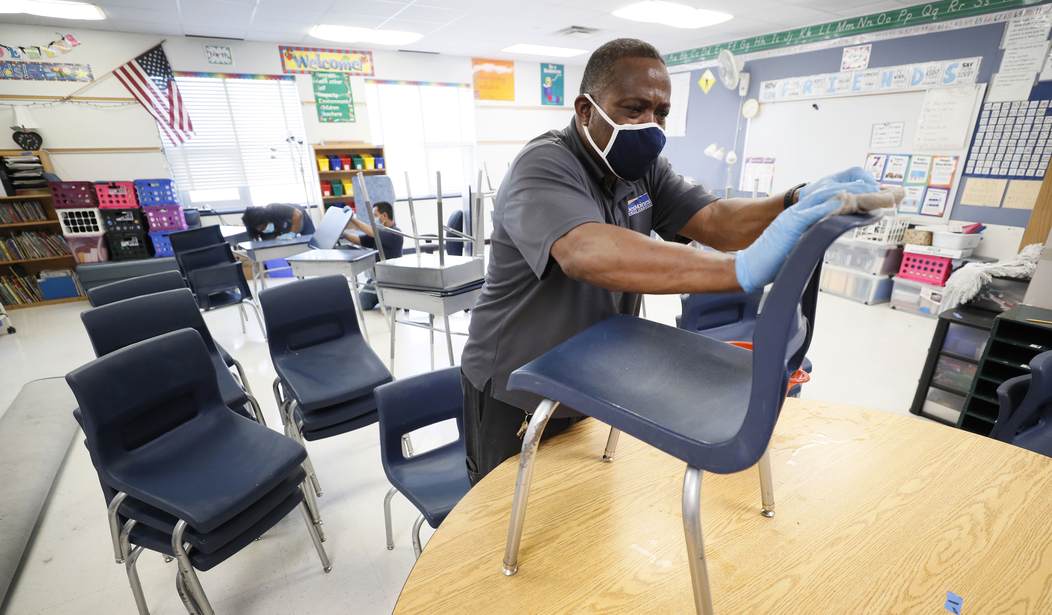Earlier this week, a teachers union leader in Los Angeles was served up a quote that read like satire. In attempting to justify the indefensible, anti-science, anti-child policy of locking students out of classrooms last year, she insisted that learning loss is a "myth." She also mused that even if kids have fallen behind on math proficiency ("times tables"), they've gotten an education in social justice and politics.
Lest you think I'm exaggerating, read for yourself:
"There is no such thing as learning loss," United Teachers Los Angeles President Cecily Myart-Cruz told Los Angeles Magazine in a rare sit-down interview when she was questioned about how her insistence to keep the school district locked down during the pandemic impacted students. "Our kids didn’t lose anything. It’s OK that our babies may not have learned all their times tables. They learned resilience. They learned survival. They learned critical-thinking skills. They know the difference between a riot and a protest. They know the words insurrection and coup," she continued.
"They didn't lose anything." This is wild stuff, especially because she's taking the position that in-person classroom instruction – the literal job of her members – is not essential. We aren't that important is an interesting stance for a union boss to adopt. But the data shows that children who were not able to attend schools lost a lot. From an important op-ed by four doctors published earlier this year:
Keeping schools closed or even partially closed, based on what we know now is unwarranted, is harming children, and has become a human rights issue...Here are the facts: First, children are not at significant risk of poor outcomes from COVID-19...Second, viral spread is minimal in schools with appropriate safety precautions, even in communities with a high disease prevalence...School closure comes with long-term individual and societal costs. Many children cannot effectively learn, group, engage, socialize, be active, eat healthy food or get support until schools physically reopen. Children with special needs and from disadvantaged backgrounds are, in general, paying the largest price. As most private and parochial school districts are open for in-person instruction, the divide between the haves and have-nots is exponentially growing. We are observing a significant psychological epidemic in children with depression and anxiety due to the isolation associated with school closure, with suicidal behaviors. Subsequent lost wages for families translates into poverty, eviction and food insecurity. Recent research assessed there are greater risks to life expectancy with schools closed versus staying open.
There are reams of evidence on learning loss and various harmful effects on kids whose schools were shuttered for months on end. The latest data on this front comes out of Connecticut:
Teachers union boss quoted this week calling learning loss during (scientifically indefensible) COVID school closures a 'myth.' Latest data out of CT further exposes that claim as insane. Kids who were mostly/fully remote were harmed the most (especially those w/ 'high needs'): pic.twitter.com/q6hBcvCG5N
— Guy Benson (@guypbenson) September 2, 2021
State test results released this week confirmed what educators and parents feared was the case: student learning at all ages and from most backgrounds has taken a hit during the pandemic. The assessment data offers a first glimpse at how student learning fared in Connecticut during COVID-19, showing proficiency rates dropped since the 2018-19 school year, the last time state tests were administered. Students who learned fully or mostly in-person last year lost the least ground, while their peers in hybrid or mostly remote models showed weaker achievement and growth. The state education department saw impacts in all subjects but the greatest differences in math...Test data show achievement in fifth through eighth grade was substantially lower last year than it was in 2018-19. The department report found the trend was independent of student need, such as learning English, having disabilities or coming from a low-income family.
"Remote learning" students with "high needs" were disproportionately impacted. None of this is the least bit surprising – including the fact that a prominent teachers union boss is trying to rationalize anti-student harm with glaring untruths and a sprinkle of cartoonish wokery. The school choice imperative is clearer than ever. I'll leave you with this. One of the few great reliefs of this horrible virus is that it basically does not kill children. That should matter as we craft COVID-related public policy affecting children:
Recommended
That means without adjusting for overascertainment, 400 of the last 54,771 pediatric deaths in the US were with COVID.
— Phil Kerpen (@kerpen) September 2, 2021
If we adjust 35% based on the CDC study of 2020 death certificates, it would be 260 of the last 54,771 pediatric deaths.

























